Scales f injustice?
Page 28
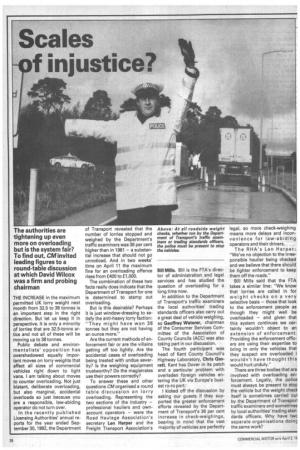
Page 29
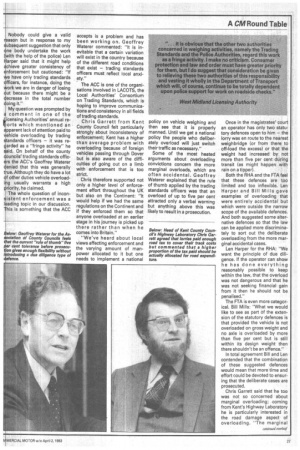
Page 30
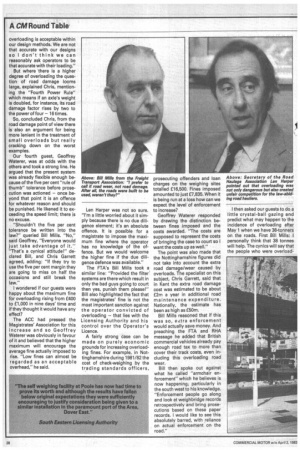
Page 31
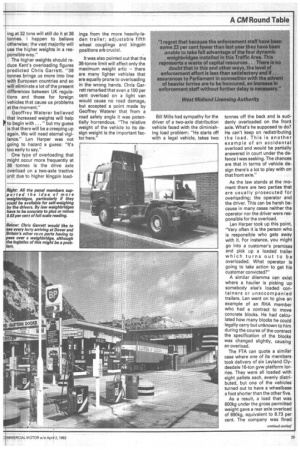
Page 32
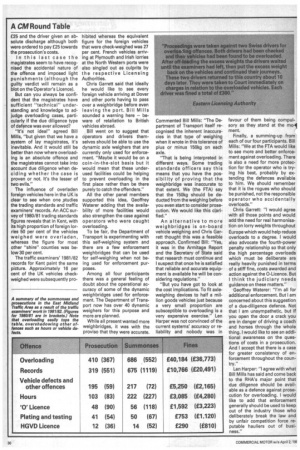
If you've noticed an error in this article please click here to report it so we can fix it.
THE INCREASE in the maximum permitted UK lorry weight next month from 32.5 to 38 tonnes is an important step in the right direction. But let us keep it in perspective. It is only a minority of lorries that are 32.5-tonne artics and not all of these will be moving up to 38 tonnes.
Public debate and environmentalists' opposition has overshadowed equally important moves on lorry weights that affect all sizes of commercial vehicles right down to light vans. I am talking about moves to counter overloading. Not just blatant, deliberate overloading, but also marginal, accidental overloads so just because you are a responsible, law-abiding operator do not turn over.
In the recently published Licensing Authorities' annual reports for the year ended September 30, 1982, the Department of Transport revealed that the number of lorries stopped and weighed by the Department's traffic examiners was 36 per cent higher than in 1981 — a substantial increase that should not go unnoticed. And in two weeks' time on April 11 the maximum fine for an overloading offence rises from £400 to £1,000.
The combination of these two facts really does indicate that the Department of Transport for one is determined to stamp out overloading.
But is this desirable? Perhaps it is just window-dressing to satisfy the anti-heavy lorry faction: "They might have won 38 tonnes but they are not having an ounce more," Are the current methods of enforcement fair or are the villains getting off too lightly. Are the accidental cases of overloading being treated with undue severity? Is the weighing equipment trustworthy? Do the magistrates use their powers correctly?
To answer these and other questions CM organised a round table discussion on lorry overloading. Representing the two sections of the industry — professional hauliers and ownaccount operators — were the Road Haulage Association's secretary Len Harper and the Freight Transport Association's Bill Mills. Bill is the FTA's director of administration and legal services and has studied the question of overloading for a long time now.
In addition to the Department of Transport's traffic examiners the local authorities' trading standards officers also carry out a great deal of vehicle weighing, so Geoffrey Waterer, chairman of the Consumer Services Committee of the Association of County Councils {ACC) was also taking part in our discussion.
The fourth participant was head of Kent County Council's Highway Laboratory, Chris Gasrett. Kent has Dover in its patch and a particular problem with overladen foreign vehicles entering the UK via Europe's busiest ro-ro port: I kicked off the discussion by asking our guests if they supported the greater enforcement efforts revealed by the Department of Transport's 36 per cent increase in check-weighhigs, bearing in mind that the vast majority of vehicles are perfectly legal, so more check-weighing means more delays and inconvenience for law-abiding operators and their drivers.
The RHA's Len Harper: "We've no objection to the irresponsible haulier being checked and we believe that there should be tighter enforcement to keep them off the roads."
Bill Mills said that the FTA takes a similar line: "We know that lorries are called in for weight checks on a very selective basis — those that look to the enforcement people as though they might well be overloaded — and given that this system continues we cer tainly wouldn't object to an extension of enforcement.
Providing the enforcement offic ers are using their expertise to bring in only the vehicles that they suspect are overloaded I wouldn't have thought this would hurt unduly."
There are three bodies that are involved with overloading en forcement. Legally, the police must always be present to stop the vehicle but the weight check itself is sometimes carried out by the Department of Transport traffic examiners and sometimes by local authorities' trading standards officers. Why have two separate organisations doing the same work? Nobody could give a valid reason but in response to my subsequent suggestion that only one body undertake the work (with the help of the police) Len Harper said that it might help achieve greater consistency of Enforcement but cautioned: "If we have only trading standards officers, for instance, doing the work we are in danger of losing out because there might be a decrease in the total number coing it."
My question was prompted by a comment in one of the iicensing Authorities' annual reIfoorts which mentioned an apparent lack of attention paid to vehicle overloading by trading standards officers — it was recorded as a "fringe activity" he said. On behalf of the county councils' trading standards officers the ACC's Geoffrey Waterer denied that this was generally t-ue. Although they do have a lot Of other duties vehicle overloading usually warrants a high priority, he claimed.
The whole question of inconsistent enforcement was a leading topic in our discussion. This is something that the ACC accepts is a problem and has been working on. Geoffrey Waterer commented: "It is inevitable that a certain variation will exist in the country because of the different road conditions that exist — trading standards officers must reflect local anxiety," The ACC is one of the organisations involved in LACOTS, the Local Authorities' Consortium on Trading Standards, which is hoping to improve communications and consistency in all fields of trading standards.
Chris Garrett from Kent County Council felt particularly strongly about inconsistency of enforcement; Kent has a higher than average problem with overloading because of foreign vehicles passing through Dover but is also aware of the difficulties of going out on a limb with enforcement that is too strict.
Chris therefore supported not only a higher level of enforcement effort throughout the UK but also on the Continent: "It would help if we had the same regulations on the Continent and if they enforced them so that anyone overloaded at an earlier stage in his journey is picked up there rather than when he comes into Britain."
"We've heard about local views affecting enforcement and the varying amount of manpower allocated to it but one needs to implement a national policy on vehicle weighing and then see that it is properly manned. Until we get a national policy the people who deliberately overload will just switch their traffic as necessary."
Some of the most heated arguments about overloading convictions concern the more marginal overloads, which are often accidental. Geoffrey Waterer explained that the rule of thumb applied by the trading standards officers was that an overload of up to five per cent attracted only a verbal warning but anything above this was likely to result in a prosecution. Once in the magistrates' court an operator has only two statutory defences open to him — the lorry was en route to the nearest weighbridge or from there to off-load the excess) or that the weight had increased by not more than five per cent during transit (as might happen with rain on a tipper).
Both the RHA and the ETA feel that these defences are too limited and too inflexible. Len Harper and Bill Mills gave examples of overloading that were entirely accidental but which were outside the narrow scope of the available defences. And both suggested some alternative defences so that the law can be applied more discriminately to sort out the deliberate overloading from the more marginal accidental cases.
Len Harper for the RHA: "We want the principle of due diligence. If the operator can show he has done everything reasonably possible to keep within the law, that the overload was not dangerous and that he was not seeking financial gain from it then he should not be penalised."
The ETA is even more categorical. Bill Mills: "What we would like to see as part of the extension of the statutory defences is that provided the vehicle is not overloaded on gross weight and no axle is overloaded by more than five per cent but is still within its design weight then there shouldn't be an offence."
In total agreement Bill and Len contended that the combination of these suggested defences would mean that more time and effort could be devoted to ensuring that the deliberate cases are prosecuted.
Chris Garrett said that he too was not so concerned about marginal overloading; coming from Kent's Highway Laboratory he is particularly interested in the road damage aspect of overloading. "The marginal overloading is acceptable within our design methods. We are not that accurate with our designs so I don't think we can reasonably ask operators to be that accurate with their loading."
But where there is a higher degree of overloading the ques tion of road damage looms large, explained Chris, mentioning the "Fourth Power Rule" which means if an axle's weight is doubled, for instance, its road damage factor rises by two to the power of four — 16 times.
So, concluded Chris, from the road damage point of view there is also an argument for being more lenient in the treatment of small overloads but really cracking down on the worst examples.
Our fourth guest, Geoffrey Waterer, was at odds with the others and took a strong line. He argued that the present system was already flexible enough be cause of the five per cent "rule of thumb" tolerance before prosecution was actioned — once be yond that point it is an offence for whatever reason and should be punished. He likened it to exceeding the speed limit; there is no excuse.
"Shouldn't the five per cent tolerance be written into the law?" queried Bill Mills. "No,"
said Geoffrey, "Everyone would just take advantage of it.—
"That's a cynical attitude!" de clared Bill, and Chris Garrett agreed, adding: "If they try to use the five per cent margin they are going to miss on half the occasions and still break the law."
I wondered if our guests were happy about the maximum fine for overloading rising from £400 to £1,000 in nine days' time and if they thought it would have any effect?
The ACC had pressed the Magistrates' Association for this increase and so Geoffrey Waterer was obviously in favour of it and believed that the higher maximum will encourage the average fine actually imposed to rise. "Low fines can almost be regarded as an acceptable overhead," he said. Len Harper was not so sure. "I'm a little worried about it simply because there is no due diligence element; it's an absolute offence. It is possible for a magistrate to impose the maximum fine where the operator has no knowledge of the offence. But we would welcome the higher fine if the due diligence defence was available."
The FTA's Bill Mills took a similar line: "Provided the filter' systems are there which result in only the bad guys going to court then yes, punish them please!" Bill also highlighted the fact that the magistrates' fine is not the most important sanction against the operator convicted of overloading — that lies with the Licensing Authority and his control over the Operator's Licence.
A fairly strong case can be made on purely economic grounds for increasing overloading fines. For example, in Nottinghamshire during 1981/82 the cost of check-weighing by the trading standards officers, prosecuting offenders and loan charges on the weighing sites totalled £16,500. Fines imposed amounted to just £7,835. When it is being run at a loss how can we expect the level of enforcement to increase?
Geoffrey Waterer responded by drawing the distinction between fines imposed and the costs awarded. "The costs are supposed to represent the costs of bringing the case to court so I want the costs up as well."
The point was also made that the Nottinghamshire figures did not take into account the extra road damage/wear caused by overloads. The specialist on this subject, Chris Garrett, said that in Kent the extra road damage cost was estimated to be about £2m a year in additional road maintenance expenditure. Nationally, the estimate has been as high as £50m.
Bill Mills reasoned that if this was so, eAtra enforcement would actually save money. And preaching the ETA and RHA message he added that British commercial vehicles already pay enough road tax to more than cover their track costs, even including this overloading road wear.
Bill then spoke out against what he called "armchair enforcement" which he believes is now happening; particularly in the south west to his knowledge. "Enforcement people go along and look at weighbridge records retrospectively and bring prosecutions based on these paper records. I would like to see this absolutely barred, with reliance on actual enforcement on the road." I then asked our guests to do a little crystal-ball gazing and predict what may happen to the incidence of overloading after May 1 when we have 38-tonners on the roads. First Bill Mills: I personally think that 38 tonnes will help. The cynics will say that the people who were overload ing at 32 tons will still do it at 38 tonnes. l happen to believe otherwise; the vast majority will use the higher weights in a responsible way."
The higher weights should reduce Kent's overloading figures predicted Chris Garrett. "38 tonnes brings us more into line with European countries and so will eliminate a lot of the present differences between UK regulations and those for foreign vehicles that cause us problems at the moment."
Geoffrey Waterer believed , that increased weights will help p to begin with ... " but my guess is that there will be a creeping up again. We will need eternal vigilance." Len Harper was not going to hazard a guess: "It's too early to say."
One type of overloading that might occur more frequently at 38 tonnes is the drive axle overload on a two-axle tractive unit due to higher kingpin load
It was also pointed out that the 38-tonne limit will affect only the maximum weight artic — there are many lighter vehicles that are equally prone to overloading in the wrong hands. Chris Garrett remarked that even a 100 per cent overload on a light van would cause no road damage, but accepted a point made by Geoffrey Waterer that from a road safety angle it was potentially horrendous. "The relative weight of the vehicle to its design weight is the important factor here."
Bill Mills had sympathy for the driver of a two-axle distribution vehicle faced with the diminishing load problem: "He starts off with a legal vehicle, takes two tonnes off the back and is suddenly overloaded on the front axle. What's he supposed to do? He can't keep on redistributing the load. This is another example of an accidental overload and would be partially answered in court under the defence I was seeking. The chances are that in terms of vehicle design there's a lot to play with on that front axle."
As the law stands at the moment there are two parties that are usually prosecuted for overloading; the operator and the driver. This can be harsh because in many cases neither the operator nor the driver were responsible for the overload.
Len Harper took up this point. "Very often it is the person who is responsible who gets away with it. For instance, you might go into a customer's premises and pick up a loaded trailer which turns out to be overloaded. What operator is going to take action to get his customer convicted?"
A similar dilemma can exist where a haulier is picking up somebody else's loaded containers or unaccompanied trailers. Len went on to give an example of an RHA member who had a contract to move concrete blocks. He had calculated how many blocks he could legally carry but unknown to him during the course of the contract the specification of the blocks was changed slightly, causing an overload.
The ETA can quote a similar case where one of its members took delivery of six Leyland Clydesdale 16-ton gvw platform lorries. They were all loaded with eight pallets each, evenly distributed, but one of the vehicles turned out to have a wheelbase a foot shorter than the other five.
As a result, a load that was 600kg under the gross permitted weight gave a rear axle overload of 890kg, equivalent to 8.73 per cent. The company was fined £25 and the driver given an absolute discharge although both were ordered to pay £25 towards the prosecution's costs.
In this last case the magistrates seem to have recognised the accidental nature of the offence and imposed light punishments (although the guilty verdict will remain as a blot on the Operator's Licence).
But can you always be confident that the magistrates have sufficient "technical" understanding and knowledge to adjudge overloading cases, particularly if the due diligence type of defence was ever allowed? "It's not ideal" agreed Bill Mills, "but given that we have a system of lay magistrates, it's inevitable. And it would still be better than now where overloading is an absolute offence and the magistrates cannot take into account due diligence when deciding whether the case is proven or not. It's the lesser of two evils."
The influence of overladen foreign vehicles here in the UK is clear to see when one ,studies the trading standards and traffic examiners' records. An ACC survey of 1980/81 trading standards figures reveals that in Kent, with its high proportion of foreign lorries 50 per cent of the vehicles weighed were overladen, whereas the figure for most other "shire" counties was below 30 per cent.
The traffic examiners' 1981/82 records for Kent paint the same picture. Approximately 16 per cent of the UK vehicles checkweighed were subsequently pro hibited whereas the equivalent figure for the foreign vehicles that were check-weighed was 27 per cent. French vehicles arriving at Plymouth and Irish lorries at the North Western ports were also singled out as culprits by the respective Licensing Authorities.
Chris Garrett said that ideally he would like to see every foreign vehicle arriving at Dover and other ports having to pass over a weighbridge before even leaving the port. Bill Mills sounded a warning here — beware of retaliation to British vehicles abroad.
Bill went on to suggest that operators and drivers themselves should be able to use the dynamic axle weighers that are currently only used for enforcement. "Maybe it would be on a coin-in-the-slot basis but it would mean that these underused facilities could be helping to prevent overloading in the first place rather than be there purely to catch the offenders."
All the other panel members supported this idea, Geoffrey Waterer adding that the availability of more facilities would also strengthen the case against operators who were caught overloading.
To be fair, the Department of Transport is experimenting with this self-weighing system and there are a few enforcement weighbridges that can be used for self-weighing when not being used for enforcement purposes.
Among all four participants there was a general feeling of doubt about the operational accuracy of some of the dynamic weighbridges used for enforcement. The Department of Transport now has over 40 dynamic weighers for this purpose and more are planned.
While all present wanted more weighbridges, it was with the proviso that they were accurate. Commented Bill Mills: "The Department of Transport itself recognised the inherent inaccuracies in that type of weighing when it wrote in this tolerance of plus or minus 150kg on each axle.
"That is being interpreted in different ways. Some trading standards officers say this means that you have the possibility of proving that the weighbridge was inaccurate to that extent. We (the FTA) say that the 150kg should be deducted from the weighing before you even start to consider prosecution. We would like this clarified."
An alternative to more weighbridges is on-board vehicle weighing and Chris Garrett thought this was a feasible approach. Confirmed Bill: "Yes, it was in the Armitage Report and the Secretary of State said that research must continue and I suspect that once he is satisfied that reliable and accurate equipment is available he will be considering regulations."
"But you have got to look at the cost implications. To fit axleweighing devices to half a million goods vehicles just because a very small proportion are subsceptible to overloading is a very expensive exercise." Len Harper was not convinced of the current systems' accuracy or reliability and nobody was in favour of them being compulsory as they stand at the mol ment.
Finally, a summing-up from each of our four participants. Bill Mills: "We at the FTA would like to see more and better enforcement against overloading. There is also a need for more protection for the operator who is trying his best, probably by extending the defences available to him. We should remember that it is the rogues who should be punished, not the responsible operator who accidentally overloads."
Chris Garrett: "I would agree with all those points and would add the need for real harmonisation on lorry weights throughout Europe which would help reduce overloads to a degree. I would also advocate the fourth-power penalty relationship so that only the high percentage overloads which must be deliberate are really heavily punished in terms of a stiff fine, costs awarded and action against the 0-Licence. But I think the judiciary needs guidance on these matters."
• Geoffrey Waterer: "I'm all for additional enforcement. But I am concerned about this suggestion • of a due-diligence defence. Not that I am unsympathetic, but if you open the door a crack you are in danger of driving a coach and horses through the whole thing. I would like to see an additional awareness on the questions of costs in a prosecution. And I accept that there is a case for greater consistency of en
forcement throughout the country."
Len Harper: "I agree with what Bill Mills has said and come back to the RHA's major point that due diligence should be available as a defence against prosecution for overloading. I would like to add that enforcement generally should be used to keep out of the industry those who deliberately break the law and by unfair competition force reputable hauliers out of business."












































































